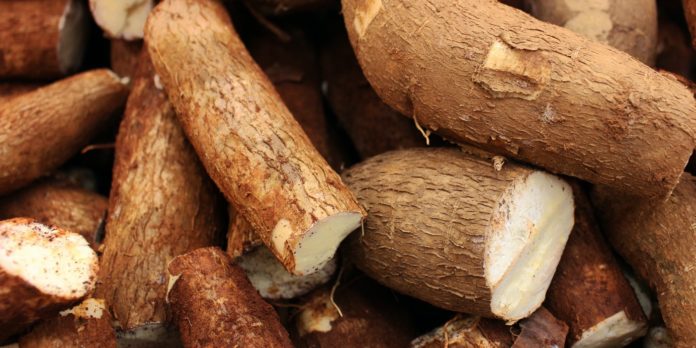What is Tapioca?
Tapioca is a natural starch that is derived from cassava roots. It is whitish and can be used to prepare different kinds of foods, ranging from pudding to baked products. It can also be eaten alone as food and can be added to soups and stews as a thickener. Studies have shown that tapioca is healthy and can supply human health with significant health benefits like improved digestion, cholesterol and metabolic activities regulator, weight management, prevents neurodegenerative health conditions, and ensures a healthy level of bone mineral density.
Studies have also shown that since tapioca takes longer to break down into sugar by the body, it can help regulate blood sugar. That is, it can help prevent diabetes and can support the health of those with prediabetic symptoms. This is not an exhaustive list of the benefits you stand to gain from adding tapioca to your diet.
Uses of Tapioca
Tapioca used to be common among the people of South America until other people across the globe started learning about its health benefits and usefulness in thickening soups and stews. Tapioca can be poisonous when prepared wrongly. This is why it is best to prepare it well and ensure that it is properly cooked before you eat it, or you can buy it from food stores where healthily processed tapioca is sold.
It has high amounts of healthy nutrients and natural properties responsible for the health benefits it supplies to human health. It is a gluten-free food, a good source of dietary fiber, has high protein content, and meets about 45% of your carbohydrates daily consumption.
Coupled with these, tapioca is low in sodium, saturated fat, and cholesterol. It has high amounts of vitamins, good cholesterol, other organic nutrients, and minerals like copper, iron, manganese, and selenium. All of these work hand in hand to make it a healthy food choice. According to research, tapioca has almost all B vitamins, but the most common B vitamins in tapioca include pantothenic acid, vitamin B6, and folate.
Having learned about the different nutrients in tapioca, you should be interested in seeing the amount of these nutrients present in every 100g serving of tapioca. Below are the nutrients contained in every 100g serving of tapioca.
Nutritional Profile of Tapioca
In every 100g of tapioca, the following nutrients in the following amounts are present;
- Fat 0.02 g
- Water 11 g
- Ash 0.12 g
- Calcium 25 mg
- Energy 1498 kJ
- Sugar 3.4 g
- Fiber 1.0 g
- Magnesium 1mg
- Protein 0.19 g
- Carbohydrates 89 g
- Phosphorus 7 mg
- Iron 2.0 mg
 Is this not enough reason to consider adding tapioca to your diet? It is healthy and contains a bit of almost all the nutrients that your body needs to function well.
Is this not enough reason to consider adding tapioca to your diet? It is healthy and contains a bit of almost all the nutrients that your body needs to function well.
Health Benefits of Tapioca
Protects Heart Health
Since tapioca has low amounts of cholesterol and saturated fat, it is a heart-healthy food. Studies have shown that consuming tapioca rather than other kinds of natural starch can help reduce your risks of suffering from heart or cardiovascular-related health conditions. Its heart-benefiting health benefits are courtesy of both its low amount of cholesterol and its high level of other heart-helping nutrients like iron and calcium. You can eat tapioca alone as food after you have cooked it. You can also add it to your soups and stews as a thickener. Another way to enjoy tapioca is by making baked products and pudding out of it.
A Healthy Choice for Restricted Diets
Studies have shown that tapioca is gluten-free, making it a healthy food choice for people who have been placed on gluten-free diets due to factors like severe health conditions, allergies, and intolerances.
Tapioca is a healthy substitute for gluten-rich foods. Thus as someone who is gluten intolerant, allergic to gluten-rich foods, and has severe health conditions that require eating less gluten, you should consider making tapioca your best food. This is because it fits perfectly into your diet description.
You can thicken your foods with it and make pudding and baked products out of it. Whichever method you adopt is delicious and will still meet your target. Other healthy flours, such as coconut flour, can be added to boost the nutritional profile of your foods.
Supports Bone Health
Tapioca is a rich source of calcium and calcium is a nutrient that supports the growth, development, and maintenance of the bones, nails, and teeth. Due to its high calcium content, tapioca can supply your body with the following health benefits;
- Healthy blood clotting
- Healthy dilation and contraction of blood vessels
- Healthy transmission of information from one nerve to the other
Since the body loses calcium daily through body wastes such as urine and sweat, it is best to consume diets that are rich in calcium to replace the lost calcium in your body. Tapioca is one of the best foods you can get healthy amounts of dietary calcium.
Reduces Birth Defects
One of the most common birth defects is neural tube defects. This defect affects most infants and can be prevented by consuming a healthy and balanced diet by pregnant women. Since tapioca has a significant amount of healthy nutrients that the body needs to function well, it is best to consume it during pregnancy.
Coupled with this, tapioca is also a rich source of folate, a B vitamin that is also known as “Pregnancy vitamin.” This B vitamin ensures healthy fetal growth and development and reduces or eliminates birth defects.
Aids Healthy Blood Circulation
Poor circulation of blood can be dangerous to your health and can even threaten your life. This is because those parts of the body that do not get enough blood would begin to lack essential nutrients and oxygen and, in no time, can cause severe damage to those parts of the body. Poor blood circulation can be triggered by numerous factors, including severe health conditions, especially those associated with the cardiovascular system.
However, with the presence of iron and copper in diets, the body will experience healthy blood circulation. Tapioca has a high amount of both minerals. Thus adding tapioca to your diet or consuming it 2 to 3 times a week can help boost your cardiovascular health and encourage healthy blood circulation.
Improves Digestion and Gut Health
Tapioca is packed with high amounts of dietary fiber, making it a healthy and ideal digestive food. With the presence of sufficient fiber in foods, digestion becomes an easy task, and gut health gets preserved. Studies have shown that people who consume tapioca about 2 times a week will experience better stool frequency, healthier digestion, and easy movement of the bowels. Further studies on people who consume tapioca frequently showed that they had lower risks of colon cancer.
Apart from helping you prevent and eliminate minor digestive issues like bloating, flatulence, and diarrhea, consuming tapioca can also help you protect your gut health and prevent colon cancer.
Helps Maintain a Healthy Blood Sugar Level
High blood sugar levels lead to nothing else but diabetes, and diabetes has been ranked as one of the leading causes of death in the world after cancer and heart-related diseases. Consuming foods that have low sugar content, as well as those that can regulate blood sugar, can help prevent diabetes significantly. Other healthy lifestyles, like engaging in physical activities and maintaining a healthy weight, can also reduce obesity, a risk factor for type 2 diabetes.
Excellent Vegan Protein
How and where to get protein without eating animal-based foods has been a major concern for vegans and vegetarians. Since most protein-based foods are from animal products and vegans and vegetarians do not eat animal-based products, getting themselves a plant-based food that contains sufficient protein to meet their daily protein needs is important.
 This is where tapioca comes in. Tapioca is a healthy source of plant protein and can meet vegans’ and vegetarians’ protein needs.
This is where tapioca comes in. Tapioca is a healthy source of plant protein and can meet vegans’ and vegetarians’ protein needs.
Conclusion
Tapioca is a healthy source of nutrients and can meet a significant percentage of the required daily intake value of the essential nutrients the body needs to function properly. Tapioca is delicious and can easily be incorporated into almost any kind of diet.




